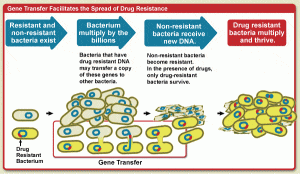As more countries begin to mass produce animal products, more antimicrobials are used to keep the animals from spreading disease. However, this commonplace antimicrobial use results in antimicrobial resistance, specifically in low and middle-income countries with few rules in place. Interestingly, most instances of microbial resistance occur in Asia and South America, but there are few instances in Africa.
Once animals develop antimicrobial resistance, it affects the rest of the food chain. When farmers give their animals antimicrobials, all of their stomach bacteria besides the resistant kind is killed. As a result, antimicrobial-resistant bacteria can spread to the soil, to produce, and to humans. Potentially, in a world without antimicrobials, even simple surgeries can be unimaginably dangerous, and diseases can be difficult to treat. At the moment, in certain countries, people are developing drug-resistant strains of malaria, tuberculosis, influenza, and even HIV.
A description of how drug resistant bacteria reproduce after other bacteria are killed.
Researchers have multiple ways of testing the spread of antimicrobial resistance. They can search for pockets where animals carry illnesses that are resistant to antimicrobials, such as penicillin. Researchers now test how many animals have resistance to drugs by giving them drugs and seeing if the animals respond. In antimicrobial-resistant hotspots, up to 50% of animals may not respond to drugs. People can struggle to find accurate information regarding the amount of drug-resistant animals, specifically in South America, where information is not always public. Researchers have also created the Resistance Bank, where people can see the specific antibiotics animals are resistant to. Its goal is to increase awareness in lower-income countries who may not have the resources to publish scientific articles describing the levels of antimicrobial resistance.
How can we protect ourselves from this growing threat? On a global scale, the spread of antimicrobial-resistant diseases can only be completely slowed with the halting of overuse on people and animals. In contrast, if we each wash our hands often, cook meat before eating it and use separate preparing utensils for raw meat and all other foods, and spread awareness about the overuse of antibiotics, perhaps each one of us can help halt the spread of antimicrobial-resistant infections.



Leave a Reply